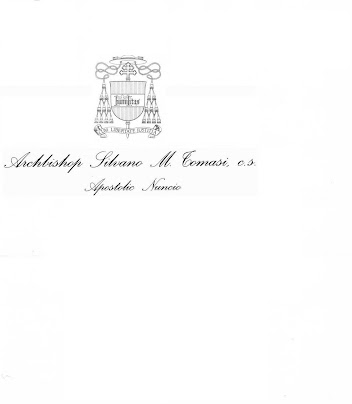INTERVENTION OF THE PERMANENT OBSERVER OF THE HOLY SEE
AT THE 90th SESSION OF THE COUNCIL
OF THE INTERNATIONAL ORGANIZATION FOR MIGRATION (IOM)
STATEMENT BY H.E. MONS. SILVANO M. TOMASI
Geneva
29 November -2 December 2005
Mr President,
1. In his first message for this year's World Day of Migrants and Refugees, Pope Benedict XVI wrote that "one of the recognizable signs of the times today is undoubtedly migration", a phenomenon which has taken on structural characteristics, becoming an important factor of the labour market world-wide, a consequence among other variables of the enormous impact of globalization.(1) In fact, the visibility of migration on the international agenda has never been so high; it is debated regularly in national parliaments, in regional conferences and at the global level. This unprecedented interest is not without ambiguity. The popular perception of immigrants reflects anxiety over economic competition, national security and cultural identity. Policy makers tend to emphasize the economic and demographic function played by foreign professionals and labourers.
On the other hand, the extraordinary positive contribution of migrants to the economy of their families and of their countries of origin through the flow of remittances and newly acquired skills, and to the realization of economic objectives in their host countries, and the contribution of their creativity and spiritual gifts, are seldom in the limelight. There is a need to overcome this ambiguity and the occasional political manipulation of the immigrants for electoral purposes, and to educate public opinion to a more objective appreciation of our new neighbors.
2. A way forward for a positive change of attitude are the current efforts to develop an effective policy coherence in migration. This policy certainly deserves support, as it represents a concerted will of sending, transit and receiving countries to respond in a comprehensive and inclusive way to contemporary migrations by taking into account both countries' labour needs and migrants' human rights and responsibilities. The added value of this approach is its timeliness. Migration pressures will continue as will continue the request of manpower in many developed countries. Experience has shown that control alone is not the answer. In fact, an exclusive focus on control brings about lack of appreciation for the root causes of migration and a real risk of reducing the migrant to his or her service function forgetting the human fundamental dimension. It also relegates into the shadows the many victims of today's increased movements of people: the migrants who die trying to reach their destinations, the women and children trafficked, the thousands of migrants and asylum seekers in detention centers, the millions of undocumented migrants. A patient and determined multilateral dialogue, among States and with immigrant communities, gives reasonable hope for realistic agreements and laws; it is the road ahead.
3. In the complexity of relationships and implications that the international movement of people entails, in no way comparable to the movement of capital and goods, the dignity and the human rights of the migrant person have to take precedence. For this reason it seems urgent to revisit the question of integration if the end result of the migration process should lead to an enriching and peaceful coexistence of different cultural expressions in society. If only the worker or only the technician is taken into account and not the human persons they are with aspirations, family ties, religious convictions and traditions, formed identities, then lack of adjustment can easily be predicted. Integration takes place from a position of strength of the newcomer and from this position can take place the transition to a new identity as cultures evolve and adapt to each other. In the long run the interest of the receiving society is served by its acceptance of newcomers in their difference and in its openness to progressively incorporate them in view of a common future. In this perspective, policies based on rights turn out to be more useful in the formation of a cohesive society and in the management of migration since they provide a common ground to negotiate competing interests. Two recent projects among those undertaken by IOM have addressed important aspects of migration that have a critical bearing on immigrants integration and hopefully will continue to be discussed and further elaborated. The first is the initiative to support the development and the teaching of the international right of migrations, that is the rights and duties of migrants and of States. It breaks new ground in bringing together partners in the migration process and in indicating a base on which to develop a fair integration of immigrants. The second initiative is the decision to address the role that religion plays in the process of integration; it involves the relation of immigrants with the receiving country and with other religions at a moment when most societies are confronted with religious pluralism. It is interesting to see how the religious variable touches the personal and group ethnic identity, inspires social services that assist immigrants to integrate, can help to transcend nationalisms.
4. Finally a word of caution seems in order as a renewed interest emerges in favor of temporary migrations. The failure of past migrant workers programs should make us aware that a rights based migration policy cannot overlook the problematic aspects of guest worker and circular migration models like compulsory employment with a specific employer as a condition and the consequent vulnerability to abuse and isolation from the host society rather than integration.
Mr President,
5. In conclusion, migrations are not just a sign of the times; they are a great resource for economic and human development, but the migrants must remain protagonists as builders of bridges among societies with the support of coherent and humane policies on the part of the international community.


Nessun commento:
Posta un commento